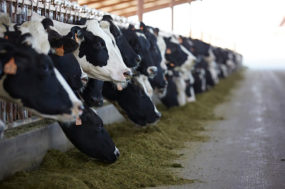There are many reasons dairy herdspersons wear respirators on their farms. Some of the respiratory hazards that are present on the farm include dust, moulds, gases, fumes and zoonotic diseases. Working with formaldehyde, copper sulphate, crushed lime and other chemicals on the farm can present significant respiratory hazards.
The best way to deal with these hazards is to eliminate the hazard, substitute the product or process with something safer or change the ventilation of the building/equipment to reduce the risk. When this is not possible, it is important to ensure that you wear the proper personal protective equipment (PPE) to get the job done safely.
Types of respirators
- Air purifying respirators work by removing gases, vapours, aerosols or a combination of contaminants from the air by using filters, cartridges and canisters. Example: N95 disposable respirator or a half- or full-face reusable respirator.
- Air-supplying respirators provide clean air from a source independent of the work area. Example: Self-contained breathing apparatus (SCBA) or supplied air respirators (SARs).
It is important that you choose the correct respirator for the task and ensure that the respirator fits properly. Fit testing is required for each model of respirator used in the workplace to ensure the respirator fits properly and will adequately reduce exposure to respiratory hazards. Everyone’s face is unique in both size and shape. You want to make sure that you choose a size that is correct for you because respirators that do not fit correctly allow hazardous particles to leak into the facepiece.
Once you have done the fit test to identify the correct respirator for you, you will also want to do a user seal check. This will identify if the respirator is positioned correctly on your face or if it needs to be adjusted.
Employees should never share respirators. Respirators should be properly cleaned on a regular basis and stored correctly. Store clean, dry respirators in nonporous, sturdy, airtight containers, such as a zip-sealed plastic bag or an airtight plastic container. Ideally, you should store cleaned respirators separately from the cartridges.
Respirators and cartridges left out in the workplace will continue to absorb contaminates, and the facepiece can become contaminated as well. Never leave respirators sitting out in the workplace, even for a short period of time, especially in an area where they can be splashed with chemicals or can have particulate dust falling on them.
Respirators are an important piece of PPE on the farm. There are many respiratory hazards found on a farm, and properly used respirators are key in allowing farm workers the ability to complete the required task without jeopardizing their health and safety. It is essential that respirators are properly used, maintained and stored so that they will be in peak condition when they are required.
References omitted but are available upon request by sending an email to the editor.










